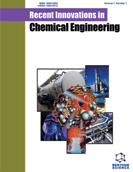Abstract
Background: Separation of proteins in countercurrent chromatography requires the use of polymer phase systems to avoid denaturation of proteins by organic solvent. The polymer phase systems has a high viscosity and low interfacial tension and requires spiral column and modification of tubing shapes for achieving a satisfactory separation. In the past, various tubing shapes were made using a pair of pliers but it requires tedious work.
Objective: The aim of this paper is to make a simple tool to modify the separation column quickly with high accuracy and reproducibility.
Method: A simple tool is introduced which can modify the shape of tubing to enhance the partition efficiency in high-speed countercurrent chromatography. It consists of a pair of interlocking identical gears, each coaxially holding a pressing wheel to intermittently compress plastic tubing in 0 – 10 mm length at every 1 cm interval.
Results: The performance of the processed tubing is examined in protein separation with 1.6 mm ID PTFE tubing intermittently pressed in 3 mm and 10 mm width both at 10 mm intervals at various flow rates and revolution speeds. A series of experiments was performed with a polymer phase system composed of polyethylene glycol and dibasic potassium phosphate each at 12.5% (w/w) in deionized water using three protein samples. Overall results clearly demonstrate that the compressed tubing can yield substantially higher peak resolution than the non-processed tubing.
Conclusions: The simple tubing modifier is very useful for separation of proteins with high-speed countercurrent chromatography.
Keywords: Simple tubing modifier, spiral high-speed counter-current chromatography, protein separation, spiral tube assembly, polymer phase system, intermittently pressed tubing.
 36
36 2
2









